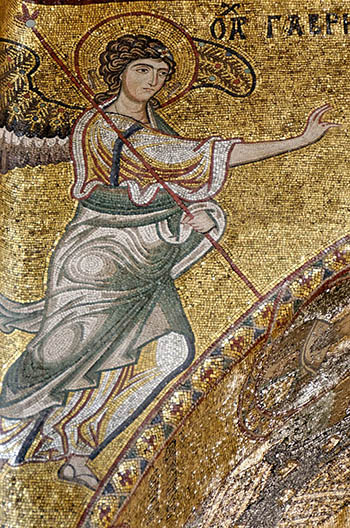
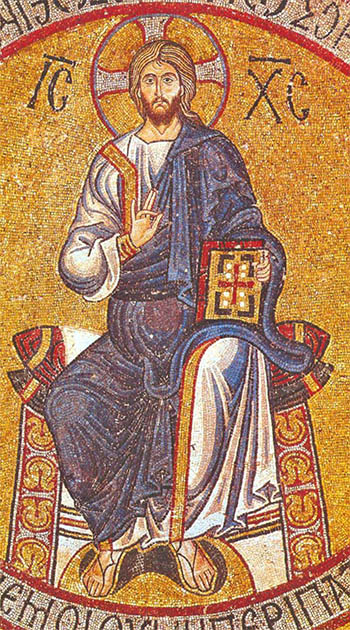
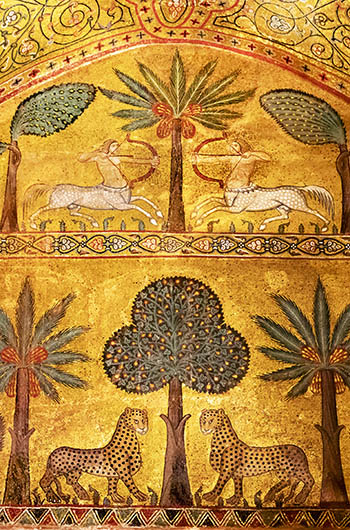

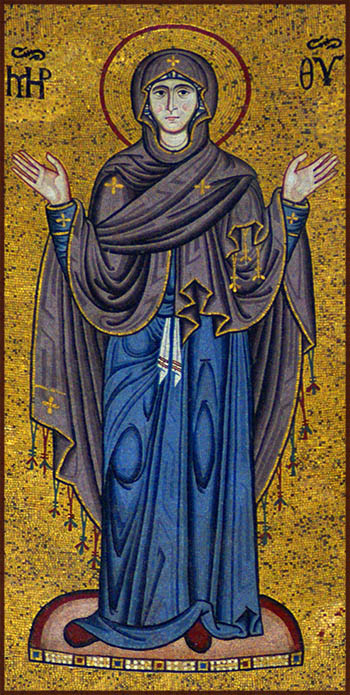
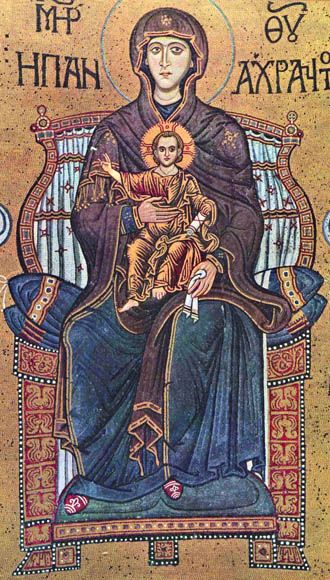

Constantine X Doukas and Eudocia
The Empresses of Constantinople by Joseph McCabe
The struggle which Theodora had foreseen was not long deferred after her death, and Michael Stratioticus was compelled, after a few months of feeble imperial experiment, to retire to the private life from which he had been unwisely drawn. The great territorial nobles—one might almost say, the feudal nobles—concentrated upon the capital and put one of their number, Isaac Comnenus, upon the throne. Isaac had in earlier years married a Bulgarian princess, and her career as mistress of a large provincial domain, and then as Empress of Constantinople, suggests a very interesting study. Unfortunately, her husband’s reign lasted only two years, and the events yield us only few and fleeting glimpses of the new Empress.
Æcatherina, as the best contemporary authority, Nicephorus Bryennius, calls her (though later writers often say Catherina), descended from the Bulgarian royal family, which had fallen from its high estate when “Basil the Bulgarian-slayer” had won a definitive victory over the nation. Bryennius makes her a daughter of the King Samuel, and we have in a later chronicle a picture of Samuel’s daughters which would dispose us to imagine Æcatherina as a very fiery and interesting personality. When, in the presence of Basil, they were brought face to face with the woman whose husband had killed their brother, the Emperor and his officers had great difficulty in preventing a very violent and undignified scene. The dates, however, make it improbable that Æcatherina was one of the daughters of Samuel—others more probably suggest that she was his niece, or182 grand-niece—and in character she seems rather to have been gentle and religious. She was brought from her remote provincial home and made Augusta, but she proved to be one of the quiet and retiring Empresses who leave no mark in the chronicles. The only reference to her is that, in 1059, she encouraged her husband, who had met with a serious accident or illness, to resign, and she herself took the veil of the nun. One suspects that her husband’s policy of curtailing the funds of the luxurious and innumerable monks alarmed her, and she was ready to believe that, as rumour maintained, the wild boar which led him into grave peril in 1059 was no ordinary animal. He resigned, and Æcatherina, changing her name to Helena, retired with her daughter Maria to a quiet mansion, where they practised monastic discipline and were esteemed so holy that Æcatherina was eventually buried in the cemetery of the monks of Studion.
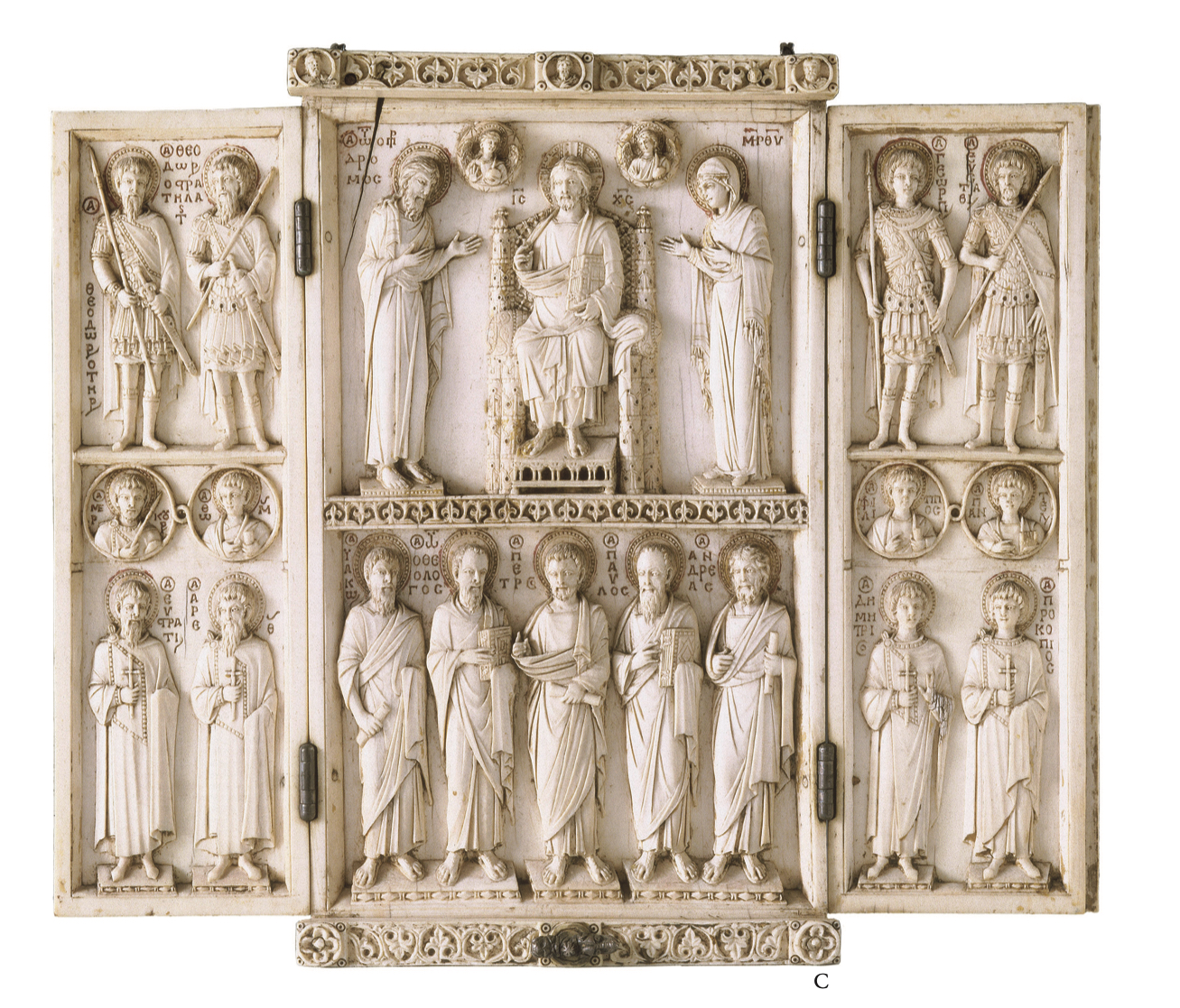 With the next Empress, Eudocia, we return to the more familiar and more piquant type of Byzantine princess: the woman who unites with her subservience to the Church a skill in casuistry which protects her human inclinations from the harsher control of the Church’s ascetic standards. Eudocia Macrembolitissa, or Eudocia the daughter of Macrembolites, a distinguished noble of Constantinople, had some beauty and no little wit, as well as good birth and breeding. In the reign of Michael IV. and Zoe she had been wooed and won by a handsome and learned, if not very warlike, commander named Constantine Ducas, and had in the subsequent twenty years of changing rulers borne three sons and three daughters to her elderly husband. Constantine was at least ten years older than she, and had no higher ambition than to be regarded as a prince of letters and rhetoric. It must, therefore, have been an agreeable surprise to Eudocia to learn, in 1059, that the retiring Emperor had transferred his crown to her husband, and she was henceforth to be the mistress of the sacred palace.183 She was then, probably, in her later thirties. She was entitled Augusta, and the imperial dignity was conferred also on her six children, of whom the youngest was born after her coronation.
With the next Empress, Eudocia, we return to the more familiar and more piquant type of Byzantine princess: the woman who unites with her subservience to the Church a skill in casuistry which protects her human inclinations from the harsher control of the Church’s ascetic standards. Eudocia Macrembolitissa, or Eudocia the daughter of Macrembolites, a distinguished noble of Constantinople, had some beauty and no little wit, as well as good birth and breeding. In the reign of Michael IV. and Zoe she had been wooed and won by a handsome and learned, if not very warlike, commander named Constantine Ducas, and had in the subsequent twenty years of changing rulers borne three sons and three daughters to her elderly husband. Constantine was at least ten years older than she, and had no higher ambition than to be regarded as a prince of letters and rhetoric. It must, therefore, have been an agreeable surprise to Eudocia to learn, in 1059, that the retiring Emperor had transferred his crown to her husband, and she was henceforth to be the mistress of the sacred palace.183 She was then, probably, in her later thirties. She was entitled Augusta, and the imperial dignity was conferred also on her six children, of whom the youngest was born after her coronation.
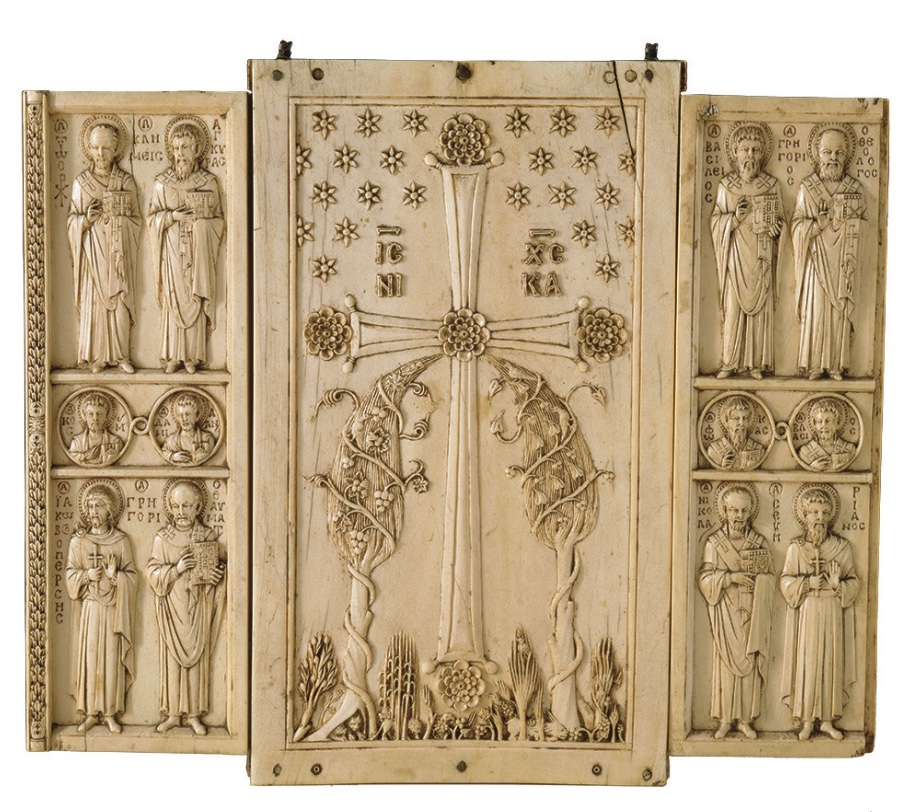 During the eight years of her husband’s reign Eudocia remained a silent witness of his futility and unpopularity. He retained his pedantry, and sought the laurels of learning and eloquence, while formidable enemies threatened the Empire on every side. In 1067 he perceived that his inglorious reign was about to end, and summoned Eudocia, the nobles and the patriarch to his couch. The nobles were commanded to swear to maintain the throne of Eudocia and her sons, and Eudocia was compelled to swear a portentous oath that she would not marry again. Possibly Constantine felt that he was not imposing a very heavy sacrifice on a woman who approached her fiftieth year, and it was plainly to the interest of his sons that she should not marry. Eudocia signed the written oath, and it was entrusted to the patriarch Xiphilin to keep in the great church.
During the eight years of her husband’s reign Eudocia remained a silent witness of his futility and unpopularity. He retained his pedantry, and sought the laurels of learning and eloquence, while formidable enemies threatened the Empire on every side. In 1067 he perceived that his inglorious reign was about to end, and summoned Eudocia, the nobles and the patriarch to his couch. The nobles were commanded to swear to maintain the throne of Eudocia and her sons, and Eudocia was compelled to swear a portentous oath that she would not marry again. Possibly Constantine felt that he was not imposing a very heavy sacrifice on a woman who approached her fiftieth year, and it was plainly to the interest of his sons that she should not marry. Eudocia signed the written oath, and it was entrusted to the patriarch Xiphilin to keep in the great church.
The regency of Eudocia lasted about seven months, during which she emulated the conduct of Zoe and Theodora. She received ambassadors, heard trials and paid more direct and closer attention to the affairs of the Empire than her late husband had done. Two things, however, concerned her and illustrated the weakness of woman-rule at Constantinople. The Turks and other hostile neighbours were raiding the provinces with greater vigour, and the nobles were making this a pretext for intrigue to replace Eudocia with an Emperor. Before the year was out Eudocia decided to marry again and sought a means of evading the oath which the patriarch grimly guarded.
The story of her outwitting the patriarch is, as we find it in the later chronicles, in the finest vein of Byzantine melodrama. She took into her confidence one of the wiliest eunuchs of her Court, who assured her that it was quite easy to induce the patriarch to release184 her. This Xiphilin, the patriarch at the time, was himself as casuistic as he was religious. Originally a noble, he had voluntarily embraced the black robe of the monk, and had been withdrawn from the monastery to rule the Eastern Church. He had in Constantinople a brother named Bardas, whose gallantries and sybaritic ways were notorious. When the eunuch proposed the subject of marriage, Xiphilin sternly maintained that the oath was binding and that Eudocia must remain a widow, but when the astute eunuch regretted that such was his view, since it was his brother Bardas whom Eudocia wished to marry, Xiphilin reconsidered the matter. It is not for us to analyse his reasoning. It is enough that in a short time he declared to the assembled Senators that the oath was unjust and invalid, a mere wanton outrage on the part of a jealous man, and he handed the precious document back to Eudocia to destroy. His feelings may be imagined when, a few hours later, he heard that the Empress was married, not to his brother, but to Romanus Diogenes.
The contemporary writer Psellus gives a more sober version, but, although Psellus was one of Eudocia’s chief ministers at the time, there can be little doubt that his vanity and policy have somewhat tempered the veracity of his narrative. Eudocia, he says, came to him in tears to complain that the cares of Empire were an intolerable burden for a single woman’s shoulders, and she wished to marry. The story is, perhaps, not inconsistent with the story of her outwitting the patriarch. In any case, the second marriage of Eudocia had an element of romance.
In the state prison of Constantinople at the time was a handsome young noble and commander named Romanus Diogenes, who ran some risk of losing his head for high treason. Distinguished by birth and in person, and a man of great spirit, he reflected that the throne of the Eastern Empire had been reached by less able men than he, and cherished a daydream of wearing185 the purple. At the death of Constantine in 1067, when there was much discussion of the empty throne and the imperial widow, he imprudently confessed his ambition to those about him in the remote province of Thrace, which he governed; he was denounced in the capital; and he was brought in bonds to Constantinople and put on trial. He had then completed his thirtieth year: a tall, comely, broad-shouldered man, with the dark skin of a Cappadocian and very winning eyes. Constantinople looked with sympathy on the manly, but impetuous, young noble. He was connected by birth with the greatest families of the Asiatic provinces, and he pleaded that it was only his concern for the safety of the menaced Empire that had wrung from him words of dissatisfaction. His treason was, however, apparent, and he was found guilty and restored to jail.
Eudocia was probably present at the trial of Romanus, and noted the handsome form and flashing eye. She professed afterwards that the trial was unsatisfactory and must be revised, and the young commander found himself acquitted and free to return to his native province. The time was not yet ripe for the marriage project; in fact, one of the historians states that Romanus was already married, and went to join his wife and family in Cappadocia. About Christmas (1067), however, he received an order from Eudocia to return to Constantinople, and may or may not have been surprised to hear that she proposed to marry and crown him. His wife and family seem to have been deserted with great cheerfulness—unless we prefer to regard the statement in the chronicle as an error24—and Eudocia secretly prepared for the marriage. Senators were bribed to support the proposal, and, on 31st December, the patriarch was won by the stratagem which I have already described. That very night Romanus was introduced, fully armed, into186 the palace and secretly wedded to the Empress, and on the first day of the new year the young Emperor and his middle-aged Empress were ceremoniously presented to the people. For a moment it seemed as if the fierce Varangian guards were about to avenge what they regarded as a violation of the oath to the dead Constantine, but Eudocia prevailed on her elder sons to assure the guards that they had consented to the marriage, and the trouble was averted for the time.
It was, however, in face of considerable hostility that Eudocia and Romanus entered upon their task of governing the Empire. The clergy were naturally hostile, since their leader had been tricked into an ignominious concession; more distinguished nobles than Romanus envied his elevation; and courtiers who were attached to the fortunes of Eudocia’s elder sons regarded the new Emperor, and the possible issue of the new marriage, with sullen distrust. Michael Psellus, the historian who boasts that he guided Eudocia’s counsels in regard to the marriage, is transparently hostile to Romanus, and his historical work is largely responsible for the traditional prejudice against that brave and spirited, but injudicious and unfortunate, monarch. Psellus was not merely the chief student of philosophy in Constantinople, but an ambitious and successful courtier. His great repute in letters and philosophy gave him a commanding position in the Court of Eudocia, who had herself some literary ambition,25 and his secret and sinuous counsels must have deeply influenced the later course of the careers of Romanus and Eudocia. A philosopher-statesman was the great ideal which Plato, whose works he revived, had urged upon the Greeks, but the fortunes of Psellus remain so even throughout the various revolutions he outlived that one187 is tempted to compare him rather with Talleyrand than with Plato’s ideal.




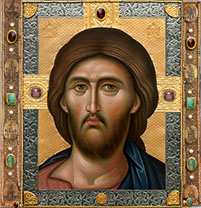 click here for icons of christ
click here for icons of christ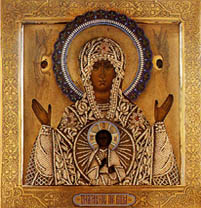 click here for icons of the theotokos
click here for icons of the theotokos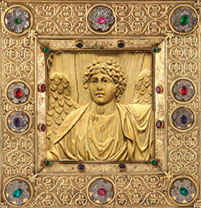 click here for icons of angels
click here for icons of angels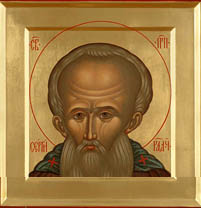 click here for icons of saints
click here for icons of saints








